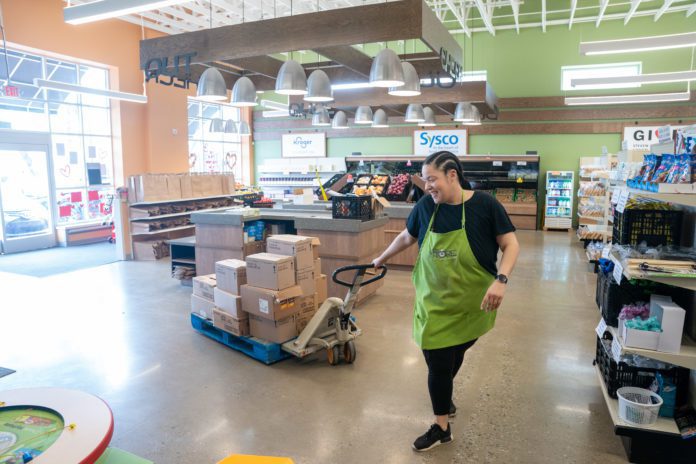Inspired by a free grocery store in California called Unity Shoppe, Belmont alumnus Brad Paisley and his wife Kimberly Williams-Paisley, a Belmont Trustee, set out three years ago to create a place where food insecure individuals and families in Nashville could receive assistance while maintaining the dignity of the shopping experience.
The Store’s philosophy of community empowerment is on the nonprofit’s website. “Most people don’t want handouts,” Paisley said. “They want dignity and respect. Most people want to become self-sufficient.”
The Paisleys worked with several partners including Belmont to open The Store in March 2020. The nonprofit had an early opening to offer aid to the elderly during the onset of COVID-19. On March 12, The Store will celebrate its third year of operation. Within that time, the nonprofit has served over 2 million meals.
Deliberately positioned on Belmont’s campus next to the Belmont Ministry Center, The Store serves the nearby Edgehill community and families in Davidson County. Belmont continues to support The Store and the Ministry Center provides wraparound services for patrons including financial planning, music therapy and mental health counseling, among others.
In the initial model, The Store was intended to serve 100 families twice a month who would also participate next door at the Ministry Center through the Family Wellness Program, but the pandemic created a much higher need for those services.
“That’s what helped us expand the number of families that we’re serving and the referral agencies that we’re working with,” executive director of The Store Courtney Vrablik said. “We’re up to about 25 referral agencies. On top of that, we have cultivated referral agencies that we can have a reciprocal relationship with.”
Today, The Store offers aid to 350 families and in a year, can aid up to 450 households. 120 of the families receive services from Belmont’s Family Wellness Program and an additional 25 families in an emergency 90-day program can receive services from The Store quarterly.
A robust referral partner group has allowed The Store to become a hub that connects people with the services they need even when the grocery store itself has reached its capacity. The full list of referral partners can be found on The Store’s website.
“We can now refer out families that don’t necessarily qualify for services next door [in the Family Wellness Program] to the agencies who are also referring families to us,” Vrablik said. “That allows us to continue to focus on building a support network under these families. We’ve been able to bring on some case managers and extra staffing to really be intentional in the way we provide information for these families so that they are getting more information and food at the same time.”
The Store also provides an opportunity for volunteer-minded college students in Nashville to serve the community. Since March 2020, students have volunteered 1030.67 hours, with 125 Belmont students volunteering to greet customers, stock shelves, run the registers, bag groceries and assist customers to their cars.
“Volunteering at The Store has made me feel much more connected to the community of Nashville,” sophomore music business and film acting major Nikki Wildy said. “Sometimes college can feel a bit like a bubble, but volunteering has allowed me to meet so many people from around the area, in both the other volunteers and the patrons. You feel like you’re really making a tangible impact in people’s lives through this incredible organization.”
The Store is more than a place to get groceries. It is a hub that connects individuals to the resources they need. The nonprofit is tuned into community needs so that it can continue finding new solutions to the question of how to address the core root causes of poverty in the community.



